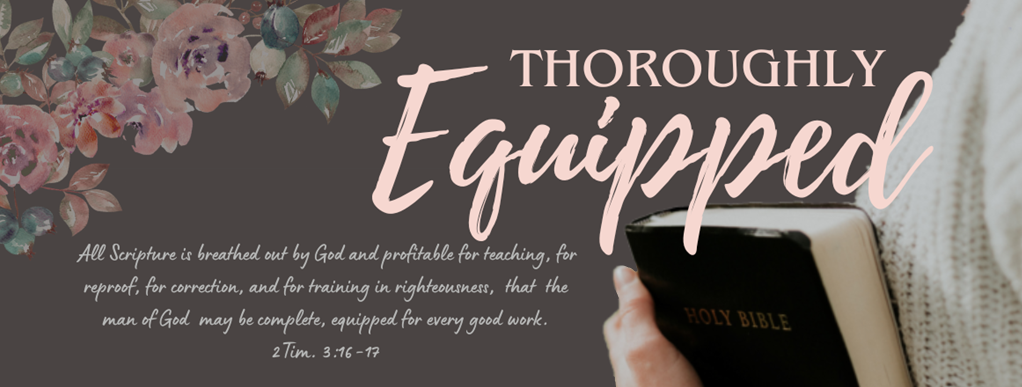Two Opposing Doctrines: Sola Scriptura vs Discerning God’s Voice



In the last couple blogs I discussed claims made by Lysa Turkeurst in her book Is God Speaking to Me? How to Discern God’s Voice and Direction. In those blogs, I countered her claims with Scripture hoping to show how the Scriptures are sufficient to equip us with righteousness and good works. So today I thought I’d go into more detail about the sufficiency, authority, inerrancy and efficacy of Scripture. This is what the reformers called Sola Scriptura.
Every woman who claims to be Christian should consider the question “what do I believe about scripture”? Why consider this question? Because the very Gospel is at stake here. A Christian woman who holds to the truths of Sola Scriptura has a firm foundation that supports the belief of salvation by grace through faith alone, the very rally cry of the Reformers during the Protestant Reformation. If Scripture is inerrant (without error) then it is authoritative. If Scripture is authoritative then it is sufficient (enough). If Scripture is sufficient then it is efficacious (effective). Without Sola Scriptura the doctrine of salvation by grace alone through faith alone is in jeopardy because it is built on a faulty foundation. It is the truths of Sola Scriptura that gives salvation by grace alone through faith alone a firm foundation. This is what is called in Reformed Theology as the Formal Principle. It is the foundation that makes the Gospel doctrines of Sola Gratia (salvation by grace alone), Sola Fide (Salvation through faith alone), Sola Christus (salvation in Christ alone), and Sola Gloria (for the glory of God alone) firm, clear, and true.
So what is the doctrine of Sola Scriptura?
Sola Scriptura is a Latin term meaning Scripture alone (sola). In essence Scripture is the soul infallible authority that guides us into salvation, righteousness, sanctification, thoroughly equipping us for every good work. Now, this is not a claim that there is no other authority. This doesn’t mean you cannot read other books or listen to others who hold knowledge. But it does mean that all other books and all other teachers, philosophies, ideas, world views are compared to Scripture being the ultimate, without error, authority. It also does not mean that only Scripture holds ALL truth. We do not learn about cells and their function in Scripture. But we do learn of Who created those cells. Scripture itself says that we can know about God by observing creation but even the facts and truths we learn in creation are limited. Scripture reveals to us God’s nature, His Son and His work, and the Holy Spirit and His work. This means that Scripture is unique being God breathed, God inspired instructions and revelations to which we compare all other authoritative information to. The Westminster Confession of Faith claims that Scripture is “the whole counsel of God, concerning all things necessary for His own glory, man’s salvation, faith, and life, is either expressly set down in Scripture, or by good and necessary consequence may be deduced from Scripture: onto which nothing at any time is to be added, whether by new revelations of the Spirit, or traditions of men.”
What does Scripture say about itself?
The Scriptures are breathed out by God.
The Scriptures have a lot to say about itself. 2nd Timothy 3:16 says that the Scriptures are theopneustos. This word, in some Bibles, is translated as the word “inspired”. This word “inspired” does not have the same meaning as we typically use it today. It does not mean an author of Scripture received mental stimulation to do or feel something and in this case write something. A better translation for this word is “breathed out”. What this means is that the Scriptures are the words breathed out by God written through the Prophets and the Apostles. The Apostle Peter in 2 Peter 1:20-21 explains this:
“And we have the prophetic word more fully confirmed, to which you will do well to pay attention as to a lamp shining in a dark place, until the day dawns and the morning star rises in your hearts, knowing this first of all, that no prophecy of Scripture comes from someone’s own interpretation. For no prophecy was ever produced by the will of man, but men spoke from God as they were carried along by the Holy Spirit.” This is the uniqueness of Scripture that sets it apart from any other authoritative book or teaching. And here’s the crutch of it. Because Scripture is God’s very breath, it holds authority that is inerrant/without fault. Therefore, as 2Timothy 3:16-17 says, it is sufficient to completely/thoroughly equip us for every good work by teaching, rebuking, correcting, and training us in righteousness.
The Scriptures are true.
Because the Scriptures are authored by God the Bible is true. God’s character is true, He cannot lie (Num.23:19; 1Sam. 15:29; Heb.6:18) and therefore, what is written cannot be a lie. Scripture claims that it is truthful (Ps. 12:16; 19:7-9; 119: 160; Prov. 30:5-6; John 10:35; 17:17), that it is flawless (Ps. 12:6; Prov. 30:5), that it is eternal (Psalm 119:89; Isa. 40:8; Matt. 24:35), unbreakable (John 10:35), boundless in perfection (Psalm 119: 96), and completely reliable (2 Peter 1:19).
The Scriptures have authority.
Scripture being breathed out by God makes it, therefore, authoritative. The Holy Spirit through the Apostle James writes in James 1:22 “do not merely listen to the word, and so deceive yourselves. Do what it says.” God is our Creator and the ultimate Authority. His words are to be obeyed.
The Scriptures are clear.
Even though it’s an ancient document and can be confusing at times, the Bible is clear enough. The unfolding of His words gives light; He gives understanding to the simple (Psalm 119:130). It’s clear enough that God commands parents to teach the Bible to their children (Deuteronomy 6:6-7).
The Scriptures are sufficient.
It contains all the words from God that we need to know Him truly, trust Him fully, obey Him perfectly, and enjoy Him abundantly. Everything we need for a godly life is available in the Scriptures (2nd Peter 1:3). It thoroughly equips us for every good work (2 Timothy 3:16) and is fully comprehensive in that regard.
The Scriptures are powerful.
Because the Bible is without error, authoritative, clear, and sufficient, it is powerful or efficacious. It is active and alive. Sharper than any double-edged sword, it penetrates even to dividing soul and spirit, joints and marrow; it judges the thoughts and attitudes of the heart (Hebrews 4:12). Basically the Bible is effective. The Holy Spirit accomplishes His plans by it (Isaiah 55:10-11).
What did Jesus think about Scripture?
In Matthew chapter 15 Jesus gives us a glimpse of what He thought about Scripture. The Pharisees and Scribes came to Jesus asking Him:
“Why do your disciples break the tradition of the elders? For they do not wash their hands when they eat.” He answered them, “And why do you break the commandment of God for the sake of your tradition? For God commanded, Honor your father and your mother,’ and, ‘Whoever reviles father or mother must surely die.’ But you say, ‘If anyone tells his father or his mother, “What you would have gained from me is given to God,” he need not honor his father.’ So for the sake of your tradition you have made void the word of God. You hypocrites! Well did Isaiah prophesy of you, when he said:
“‘This people honors me with their lips,
but their heart is far from me;
in vain do they worship me,
teaching as doctrines the commandments of men.’”
Notice here that to Jesus Scripture/God’s revealed word that was written down, has authority. So much so that to neglect it for a tradition made by man is condemned by him.
What are the implications of Sola Scriptura? And how does it affect the teachings of how to discerning God’s voice?
So in answering these questions I’m going to present some information that is given by two resources that I highly suggest you read and listen to in your spare time. Those two resources are Jim Osman’s book God Doesn’t Whisper and a series titled “Decision Making and the Will of God” by Greg Koukl of Stand to Reason (str.org).
In Jim Osman’s book God Doesn’t Whisper he identifies three faulty assumptions that are involved in, what Mr. Osman calls, the HVG (hearing the voice of God) doctrine. These three assumptions are: 1) that we should expect to hear from God, 2) that we must learn to hear from God, 3) that we need to hear from God.
So let’s look at number one: that we should expect to hear from God. So what’s the problem with this assumption? In Lysa Turkeurst’s book Is God Speaking to Me, Lysa uses the parable in John 10 of the Good Shepherd to teach us that God speaks to His sheep to give us direction. This is the main passage HVG teachers use in Scripture to make the claim that we must hear from God for direction in our life. I dive into John 10 and this parable in episode 3 of this podcast . I show how John 10 is describing salvation and that the Shepherd calls the sheep to follow Him. In the context, Jesus is telling the parable to warn the Pharisees of entering the sheepfold by any other way then through Christ Himself the Shepherd. The thing is that there is no teaching in Scripture that God speaks to us through nudges, heart impressions, or inner voices. So not surprisingly, there are no teachings in Scripture on how to discern if inner voices are from God. If it was true that we should expect to hear from God then God would instruct us in Scripture since Scripture thoroughly equips us for every good work.
Assumption number two: that because God is speaking to us we must learn how to discern His voice. The problem with this assumption is it makes God weak. It assumes that God cannot speak loud enough or clear enough that we would know it was Him. “Where does the bible say His voice is difficult to hear, challenging to discern and waiting to be heard? You won’t find it. Yet, without any biblical precedent, either by explicit teaching or example, hearing the voice of God teachers claim God’s voice is so easily eclipsed by the noise of our daily lives and so quietly whispered in the recesses of our distracted minds, that we are in danger of missing it”(God Doesn’t Whisper, pg 76). This idea that we must discern God’s voice is an affront to the power and sovereignty of God. Implying that He is not powerful or cannot be loud enough for one to hear and know it is Him.
And then finally, the third assumption: that we NEED to hear from God. HVG (hearing the voice of God) teachers have a different view of Scripture than what has been traditionally held. “They view Scripture as a necessary tool given by God to teach us how to hear His voice in our thoughts”(God doesn’t whisper, pg.46). This was seen clearly in Lysa’s book. “God’s Word is the language the Holy Spirit uses to help us understand what God is speaking to our hearts…this will transform our mind and prepare it for whatever God wants to tell us”(Is God Speaking to Me?,pg. 29). This is an attack on the very Sufficiency of Scripture. If Scripture is enough to thoroughly equip us for every good work then there is no NEED to hear and discern inner impressions for good works.
The discerning God’s voice through inner heart impressions and nudges attack the inerrancy of Scripture because it attacks the authority, the clarity, the sufficiency, and the efficacy of Scripture.
Here’s how this plays out:
If we were to receive direction from God through inner heart impressions and nudges that we must discern then those directions are of equal authority as Scripture is. Those directions must be obeyed as Scripture must be obeyed.
To claim one must learn how to discern God’s voice is to claim that God cannot be clear in His speaking to us. When reading Scripture we can see that He can audibly speak to those He chooses to and make very clear His directions and words.
To claim that God speaks to us apart from Scripture is to deny what second Timothy 3:16-17 says. That it thoroughly equips us for every good work. To say that we must discern God’s voice apart from Scripture is to say that Scripture is not sufficient enough to equip us day-to-day into the good works that God prepared beforehand that we should walk in (Eph.2:10). See the contradiction?
All of this discerning of God’s voice apart from Scripture also claims that God’s Word is not powerful/effective enough to do what He says it will do. It claims that there is more revelation, public or individual, that is needed. This includes impressions and claims of the “God told me to tell you…” statements. If Scripture is all we need as God has said it’s all we need, He will not contradict Himself by sending someone to tell us new revelation/direction. This does not mean that God does not guide us in his Providence through the Holy Spirit. I want to make a distinction here. A distinction in words used by many Christians today. There is a difference between the guidance of God through His Providence by the Holy Spirit given to us and the guidance of God through claims that God is speaking to us.
Is Sola Scriptura a big deal? And how does it affect the life of a godly woman?
So as you can see, the doctrine of Sola Scriptura is a very big deal. It is one of the most important doctrines for Christian living as it is where we receive all the other doctrines that direct toward salvation and train us in righteousness.
So how does this affect Christian women? This means that the Bible will be the most important book in the Christian woman’s life. If you want to know how to be a godly woman, you read the Scriptures. If you want to know how to be a godly wife, you read the Scriptures. If you want to know how to be a godly mother, you read the Scriptures. You want to know how to be saved and all that’s entailed in that? You read the Scriptures. You want to know how to be sanctified? You read the Scriptures. You want to know God? You read the Scriptures. You want to know Christ? You read the Scriptures. You want to be guided by the Holy Spirit? You read the Scriptures.
This doesn’t mean you don’t read other books on spiritual living, salvation, doctrine, theology, etc. But the books that we choose should exegete the Scriptures. They will help us understand God’s Word better. And always, they will be compared ultimately to what Scripture says. This is my prayer for this blog; to show you how to compare the popular women’s ministry books to Scripture. And believe me, it will change everything.
Until next time let us be Sola Scriptura Sisters.
Let us be in His Word,
MelbaToast
To order Jim Osman’s God Doesn’t Wisper: https://www.amazon.com/God-Doesnt-Whisper-Jim-Osman/dp/0998455024/ref=sr_1_1?dchild=1&keywords=god+doesn%27t+whisper&qid=1619119686&sr=8-1
To listen/watch Greg Koukl’s series “Decision Making and the Will of God” from Stand to Reason:https://www.youtube.com/watch?v=mcdQ6lGqNpU
Other great resources from Stand to Reason: https://www.youtube.com/user/STRvideos/featured




Recent Comments